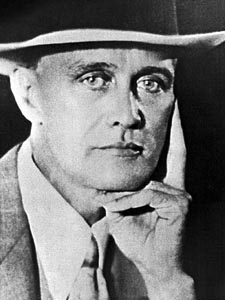 This Goodly Land
This Goodly Land
T. S. Stribling (March 4, 1881–July 8, 1965)

Other Names Used
- Thomas Sigismund Stribling: full name
Alabama Connections
- Gravelly Springs, Lauderdale County: home of maternal relatives
- Florence, Lauderdale County: education, brief adult residence, setting for three of his novels
- Tuscaloosa, Tuscaloosa County: education, brief adult residence
Selected Works
- Stribling, T. S. Birthright: A Novel. New York: Century Co., 1922. An online version of Birthright is available from Google Book Search.
- Stribling, T. S. Teeftallow. Garden City, N.Y.: Doubleday, Page & Co., 1926.
- Stribling, T. S. The Forge. Garden City, N.Y.: Doubleday, Doran & Co., 1931. Rpt. University: University of Alabama Press, 1985.
- Stribling, T. S. The Store. Garden City, N.Y.: Doubleday, Doran & Co., 1932. Rpt. University: University of Alabama Press, 1985.
- Stribling, T. S. Unfinished Cathedral. Garden City, N.Y.: Doubleday, 1934. Rpt. University: University of Alabama Press, 1986.
Literary Awards
- Pulitzer Prize, Novel, 1933, for The Store
- “Guileford” included in O. Henry Memorial Award Prize Stories of 1934
Biographical Information
T. S. Stribling was born in Clifton, Tenn., where his parents ran a weekly newspaper and then a general store. As a boy, Stribling spent summers with relatives living near Gravelly Springs, Ala. Although he wanted to write, to please his parents Stribling trained to be a teacher. He studied first at Southern Normal College in Huntingdon, Tenn., then at the State Normal College in Florence, Ala. (now the University of North Alabama), from which he graduated in 1903. He taught in a public school in Tuscaloosa for one year, then entered law school at the University of Alabama, from which he graduated in 1905. He briefly practiced law in Florence, then returned to Tennessee to work as an office boy for a Nashville magazine. He left the magazine in 1908 and began to write full-time. He worked briefly as a reporter for the Chattanooga News in 1917, and he served as a stenographer for the Federal Aviation Bureau in 1918 as his contribution to the war effort.
As a professional writer, Stribling initially wrote children’s stories for Sunday school magazines and adventure stories for popular magazines. In 1917, he published his first novel, The Cruise of the Dry Dock, a “potboiler.” His first “serious” novel, Birthright, was published initially as a serial in Century Magazine in 1921-22, then as a book in 1922. His most famous novels, The Forge, The Store, and Unfinished Cathedral, formed a trilogy about the rise and fall of a fictional Florence family, the Vaidens. He continued to write both “potboilers” and "serious" novels until 1938. After that, he published only short stories in popular magazines such as Ellery Queen’s Mystery Magazine until his retirement in 1955.
Interests and Themes
T. S. Stribling has been called a pioneer in social realism novels. His “serious” novels examined race and class issues and treated blacks and poor whites realistically and sympathetically. His work anticipated and possibly influenced the fiction of writers like his contemporaries Erskine Caldwell and William Faulkner.
For More Information
Please check your local library for these materials. If items are not available locally, your librarian can help you borrow them through the InterLibrary Loan program. Your librarian can also help you find other information about this author.
There may be more information available through the databases in the Alabama Virtual Library. If you are an Alabama citizen, AVL can be used at your public library or school library media center. You can also get a username and password from your librarian to use AVL at home.
Reference Books
- Stribling, T. S. Laughing Stock: The Posthumous Autobiography of T. S. Stribling. Ed. Randy K. Cross and John T. McMillan. Tuscaloosa: University of Alabama Press, 2003.
- Vickers, Kenneth W. T. S. Stribling: A Life of the Tennessee Novelist. Knoxville: University of Tennessee Press, 2004.
Reference Book Chapters and Encyclopedia Entries
- Going, William T. "Store and Mockingbird: Two Pulitzer Novels about Alabama"; Essays on Alabama Literature. Tuscaloosa: University of Alabama Press, . 9-31.
Reference Book Prefaces
- Cross, Randy K. Introduction. The Forge by T. S. Stribling. University: University of Alabama Press, . v-xvi.
- Cross, Randy K. Introduction. The Store by T. S. Stribling. University: University of Alabama Press, . x-xiii.
- Cross, Randy K. Introduction. Unfinished Cathedral by T. S. Stribling. University: University of Alabama Press, . v-xiii.
Reference Web Sites
- T. S. Stribling Museum. 2003. City of Clifton, Tennessee. http://www.cityofclifton.com/t_s_stribling_museum.asp .
- Oliver, Philip. T. S. Stribling. 2002. University of North Alabama Libraries. http://www2.una.edu/library/stribling/ .
- Poole, Gregory G. "Thomas Sigismund Stribling 1881-1968". Tennessee Encyclopedia of History and Culture. 2002. Tennessee Historical Society. http://tennesseeencyclopedia.net/imagegallery.php?EntryID=S107.
- Spurlock, Jefferson T. "T. S. Stribling". The Encyclopedia of Alabama. 2008. Alabama Humanities Foundation and Auburn University. http://www.encyclopediaofalabama.org/face/Article.jsp?id=h-1834.
Location of Papers
- Tennessee State Library and Archives
Photo courtesy of the Collier Library Archives, University of North Alabama.
Last updated on Feb 29, 2008.